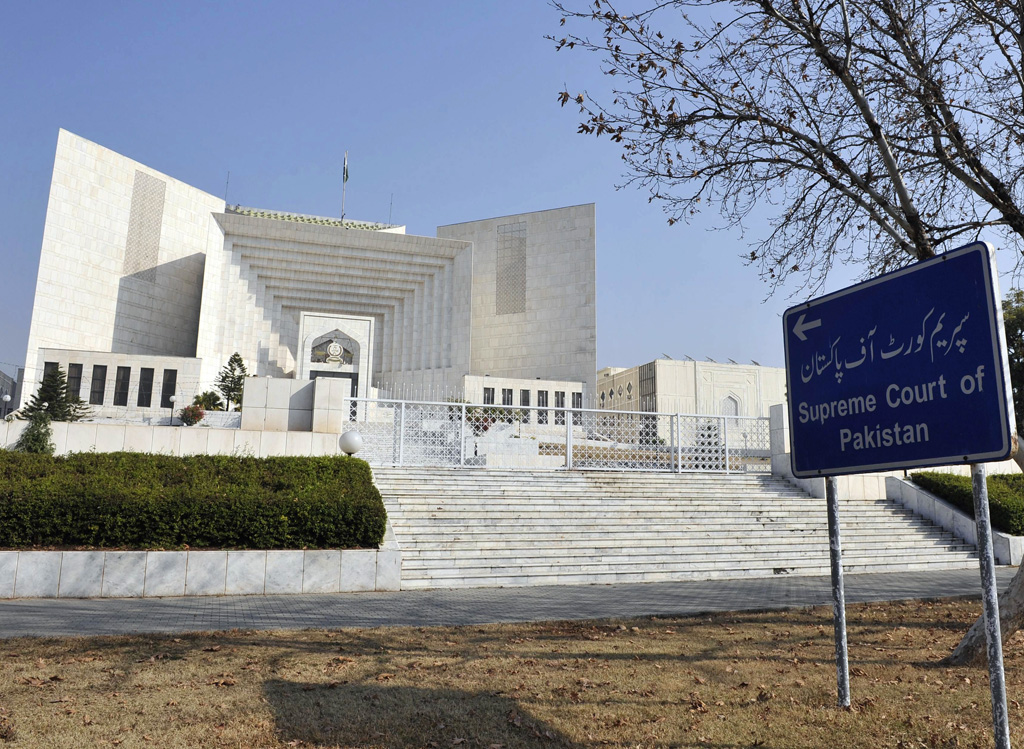
A large number of senior lawyers had gathered inside courtroom No. 1 on Wednesday to observe Sharifuddin Pirzada, General (retd) Pervez Musharraf’s leading counsel in the review petition against the top court’s July 31, 2009 judgment, in action.
“There was hostilitybetween General Musharraf and former chief justice Iftikhar Chaudhry,” Pirzada told the 14-member bench headed by Chief Justice Tassaduq Hussain Jillani. “The judge who influenced others was chief justice Chaudhry,” he added.
The lawyer stated that he would make his arguments on three issues; namely judges’ bias; deviation from the Constitution; and the views of Quad-e-Azam Muhammad Ali Jinnah regarding the Supreme Court and the Constitution.
Regarding the bias, Pirzada contended that the July 31, 2009 judgment be declared void on the basis of retired justice Chaudhry’s bias. He said that if one member of a bench is biased, the judgment is vitiated, adding that the judge, who influenced the others was the former chief justice because the then president had sent a reference against him.
“Apart from the presidential reference, do you have any evidence that then CJP was biased against your client?” Justice Nasirul Mulk asked the counsel.
Pirzada responded that Justice Chaudhry did not take oath under the Provisional Constitutional Order (PCO) on November 3, 2007 and that Adul Hameed Dogar became the new CJP. The bench, however, expressed dissatisfaction over his reply and observed that other judges had also not taken oath under the PCO.
Justice Mian Saqib Nisar observed that while Pirzada had alleged that the former CJP was biased, he did not mention in the review petition how the former chief justice had influenced other members of the bench that issued the July 31 2009 judgment.
He said that barring one judge [Iftikhar Muhammad Chaudhry], the defence has shown full confidence in other judges in its review petition. The court asked him to furnish solid material that the former chief justice had used his influence over the other 13-member bench and dictated that they deliver judgment against Musharraf.
Referring to the Supreme Court’s judgment in the presidential reference regarding the appointment of superior court judges, Justice Asif Khosa said that disqualification of a one-member bench could not affect the validity of a whole judgment.
“You are very much agreed that we [serving judges] are too independent. Though you are not used to such kind of independence of judges,” he told Musharraf’s leading lawyer. The court asked the learned counsel to conclude his arguments within one hour in today’s (Thursday) hearing.
Musharraf’s lawyer Ibrahim Satti alleged that this court had become a complainant in the high treason case against Musharraf as the prime minister had also issued a statement that if he would not initiate high treason proceedings then he might face contempt proceedings.
In response to this, Chief Justice Jillani made it clear that the apex court could interfere whenever any institution of the country becomes dysfunctional.
The chief justice observed that each department or institution has its own function and if these institutions become dysfunctional then it is the duty of the Supreme Court to interfere.
Meanwhile, the bench also resolved the controversy regarding the genuineness of the seven-member bench’s restraining order against the November 3, 2007 emergency and PCO.
Satti raised questions over the validity of that order and stated that one member of that bench, Justice (retired) Rana Bhagwandas, was not present in the Supreme Court at that time and had signed the order on November 5, 2007.
Upon this, Justice Nasirul Mulk rejected his stance and said Bhagwandas had signed on the same day as he himself was also member of that bench.
The petitioner’s counsel asked why the high treason case is being initiated if the November 3, 2007 restraining order is authentic, as the court had stopped all the government’s functionaries for supporting the emergency and PCO. Upon this, Justice Asif Khosa said the court could not instruct any complainant for the nomination of the accused in any case.
Published in The Express Tribune, January 30th, 2014.
COMMENTS (15)
Comments are moderated and generally will be posted if they are on-topic and not abusive.
For more information, please see our Comments FAQ





1732967296-0/Untitled-design-(15)1732967296-0-270x192.webp)
1732961640-0/BeFunk_§_]__§-(9)1732961640-0.jpg)
1732954958-0/Untitled-design-(14)1732954958-0-270x192.webp)

1732951088-0/Untitled-design-(11)1732951088-0-270x192.webp)
1732966095-0/Express-Tribune-(5)1732966095-0-270x192.webp)






Musharraf application dismissed being time barred may be its appropriate to remind H’able judges they admitted MNS appeal after 8 yrs. Isnt he the same judge the current CJ who saved NS in 2009 taking his petition in hijacking case after staggering 8 years yahan time barring nahi tha. This judiciary is violating article 10 of the constitution and are biased for the fact that Musharraf acted on Nov 3 2007 according to Article 209 and Article 232 of the constitution.
Newsitem of 2009: http://www.nation.com.pk/politics/17-Jul-2009/Supreme-Court-acquits-Nawaz-Sharif-in-plane-hijacking-case
Musharraf application dismissed being time barred may be its appropriate to remind H'able judges they admitted MNS appeal after 8 yrs
Actual Article 6 as on 3rd Nov 2007
'Any person who abrogates or attempts or conspires to abrogate, subverts or attempts or conspires to subvert the Constitution by use of force or show of force or by other unconstitutional means shall be guilty of high treason.'
Actual Article 6 after 18th Amendment. (with effect from April 19, 2010)
Any person who abrogates or subverts or suspends or holds in abeyance, or attempts or conspires to abrogate or subvert or suspend or hold in abeyance, the Constitution by use of force or show of force or by any other unconstitutional means shall be guilty of high treason.
On both occasions 12th Oct 1999 and 3rd Nov 2007 the Constitution was held in abeyance, the amendment was effective from April 19, 2010.
As a matter of fact article 6 is not applicable in any case other wise out of enmity or personal grudge as in this case.
"The chief justice observed that each department or institution has its own function and if these institutions become dysfunctional then it is the duty of the Supreme Court to interfere." Which article of the constitution stipulates that???? Why not then the Army can do the same???
"Court could not instruct any complainant for the nomination of the accused in any case".If this is correct,then why did the SC only named Musharraf for violation of the constitution for Nov 3,2007 Emergency.Why it did not say,that Musharraf and all those who abetted and collaborated, validated the PCO order have violated the constitution on Nov 3,2007 in view of the SC order of Nov3, 2007?.Isn't the judgement given on 31july 2009, soon after restoration of the former CJ clearly show the bias of the entire Bench towards Musharraf alone and that it was influenced by the presence of the former CJ in it by only mentioning his name and omitting abettors and collaborators?.The bias is crystal clear.
@Ajab Khan Baloch:
There are other articles of the constitution which are broken by the whole prov and federal assembly eg article 62 and 63. Why focus on article 6 only?
It seems to me that the judges are acting from the prosecutor's side, already. Mr. Akram Shaikh doesn't have to do much work now.
Total waste of time by Mush. These courts are .......
Musharaf broke the constitution and should be tried under Article 6 of the Constitution: High Treason
Let justice be done.
What a farce. Arguments pro and con should be concluded in a day, as it happens in UK, USA and Europe. Not over months, by which time everyone's mind is cluttered with irrelevant information. Then the court is adjourned indefinitely. End of matter and waste of taxpayers money.